Remittance Girl's Blog, page 32
June 27, 2012
In Honour of #BipolarAwarenessDay : Revisiting the Grave Cave
 One of the things that I think very few of my readers know about me is that I am bipolar. I’ve hesitated to say anything about it because I’ve always feared that if people knew, they would simply discount anything I had to say.
One of the things that I think very few of my readers know about me is that I am bipolar. I’ve hesitated to say anything about it because I’ve always feared that if people knew, they would simply discount anything I had to say.
So, why have I decided to be public about it? Well, there are a number of reasons.
I think I feel like finishing my masters was proof that, even though I’m not particularly normal, I can function intelligently. It is as if society has vetted me: everything I say is not rubbish (although I’m sure it sometimes is.)
I also wanted my readers to know why I go through long periods in which I shut down and don’t write. I write when I’m manic, and find it impossible to do when I’m depressed. It’s as if my ability to generate ideas plummets by 90%. And those I do get, I discount as being second-rate. When I’m manic, I become incredibly productive. I’m blessed with a type of mania that allows me to focus intensely and for long periods of time. Hence the multi-part stories that come out in great big glouts. But why can’t I finish them? I still haven’t been able to answer that.
Another reason I wanted to come clean about it is that there are a lot of people who suffer from bipolar disorder, who feel like they won’t make it through. The suicide rate for us is very high – astonishingly high for those who don’t get treatment. And, when we do get treatment, many of us feel like half of who we are has been cut out with the insanity. You see, we love the highs.
I was diagnosed with the disease almost 20 years ago.
Once I understood the illness, I realized that I had been sick since I was about 14. But going into the music business is a perfect place to hide if you are bipolar; it’s an industry that accepts the flights of mania as a performer’s natural state, and forgives the depression as poetic. It wasn’t until an international record contract I had been signed to fell apart, that I plunged into a trough so deep, I could not – for anything in the world – find a reason to go on living. I spent eight months in bed, watching TV, listening to a walkman and playing game-boy all at the same time to drown out the rushing, horrific, death-obsessed thoughts that ploughed through my brain like a never-ending freight train. If I tried to force myself to go out, I’d have raging panic attacks during which I was absolutely sure I was facing imminent death, right there in the middle of the snack aisle in the supermarket. Then I just stopped trying to force myself.
One morning, at about 5 AM, I lay in bed and looked at my open closet and, very calmly, decided that the rail was indeed high enough to hang myself on. It seemed the sensible thing to do.
Some very small corner of my mind spoke up and said: “Wow, this isn’t normal.” It saved my life.
I put my coat on, over my pyjamas, laced my sneakers on my bare feet, and walked down the street at dawn to the closest hospital. I walked up to the emergency counter and told them exactly what I was thinking. Luck must have been smiling down on me, because the woman behind the counter nodded her head, said, “Follow me.” And walked me up to the psych ward.
Another stroke of luck was that, although I was initially diagnosed with major depression, my regular doctor suggested I go and see a friend of his – a very old Czech psychiatrist who had been kicked out of his chair at a prestigious university for testing a new drug on manic-depressives.
At that time, the drug of choice – the only drug – for treating manic depression was lithium, which is a salt. It works, but the dosage you have to take to get results is very close to a toxic dose. It has terrible side-effects: your skin goes grey and lumpy, the muscles in your face that relay your emotions stop working, you have constant stomach problems.
After being diagnosed as bipolar, this rebel Czech put me on a drug called carbamazepine. It wasn’t a new drug – it had been used to treat epileptics with grande mal seizures for many years. He believed that it had great potential for helping with manic-depression. The only problem was that, in a very few number of patients, it could plummet their white blood cell count. Most psychiatrists felt it was a dangerous alternative to a drug they knew that worked. Lithium might be uncomfortable, but it didn’t actually *kill* the patients who took it.
I spent about five years on “tegretol” (carbamazepine). And the drug worked brilliantly for me. But, as I mentioned earlier, even the new treatments all have a significant downside that I feel a lot of psychiatrists don’t fully understand. The drugs stop us from behaving abnormally – but they also have a severely negative effect on creativity.
It is ironic to speculate that, if I hadn’t been diagnosed and treated, I might have been writing brilliant things for the last 20 years. On the other hand, if I hadn’t been treated, I might just have easily been dead. And that’s the catch, because finding a balance between living productively with un-medicated manic-depression and dying from it is such a tricky thing.
I went off my medication about ten years ago. Partly because I felt a great deal better, and partly because, with the help of an extraordinarily good psycho-therapist, I learned to listen for the tell-tale signs of an approaching season of either mania or depression.
I learned, for instance, that sleep is incredibly important in keeping me mentally healthy. I don’t need more than about six hours a night, but if I don’t get it for a couple of nights in a row, or my sleep is interrupted – and especially if I start to experience early-morning waking – it’s time to think about going back on the drugs.
Another important thing I learned was that one of the biggest triggers for me is a certain, very specific, sort of stress. I actually enjoy high-stress situations where I feel challenged: deadlines, budget constraints, and heavy workloads, having to operate at the edge of my capacity. I find situations like this invigorating and life-affirming. But I cannot bear the stress that comes from being in a position of responsibility with no authority; a situation where I can’t succeed because I don’t have control or power to actually meet the expectations or the goals set. This type of stress is poison for me and it will trigger a descent into depression within three or four days.
There are a few other minor danger zones, but those two are the most perilous. And in the past 15 years, I’ve learned to avoid them very cleverly. I always have sleeping pills on hand in case I am not sleeping well, and I know enough to walk away from situations in which I feel I’m being set-up to fail.
That self-knowledge makes it possible for me to live without the medication, which, in turn, allows me to write creatively. But it also means that I am not ‘normal’. And I do actively navigate the milder highs and lows.
I’m sensitive to the times when the lethargy and chill of depression creeps into my life, and I’m equally aware of when the volume and frenetic thinking of mania pushes at the edges of my balance. I have to admit to riding them. And I’m not always as quick to recognize the over-reaching, grandiose thinking that signals mania, as I should be. For instance, about two years ago I decided that it would be absolutely no problem to take a certificate of jurisprudence, and do my PhD at the same time. Two days later, I leveled off and realized just how dumb that idea was. Sometimes it takes me a day or two to realize I’m not thinking sensibly, but I get there, and stop myself.
The lows are a little harder to recognize, because I don’t get “sad”. It’s more that a strange sort of creeping mental paralysis takes over. I don’t want to go out, I don’t have the energy to engage with the rest of the world. But when I start bargaining with myself about getting out of bed in the morning, I know what’s happening and I force myself to go out, get involved, teach my classes. Being around people – especially my students – pulls me out of it. Just by being who they are, they show me the light at the end of the tunnel, and very soon, the sense of futility lifts.
It’s with a certain about of embarrassment that I write this blog post. I know a lot of people blog about their personal problems, and I think that’s fine. But it isn’t usually what I use mine for. But equally, I just felt that after eight years of writing extremely intimate stories online, I kind of owed you some openness.


June 26, 2012
Perfect Abs and Emo Too: Bared To You Reviewed
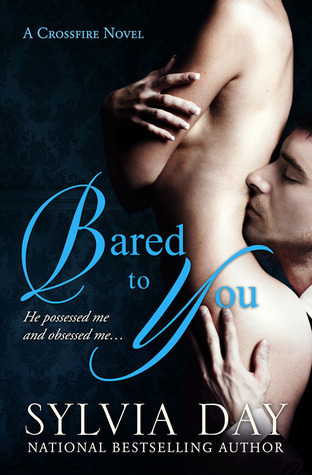 I decided to read Bared To You because it was sold as a well-written version of Fifty Shades of Grey. And I thought: hey, maybe the optimists were right! Maybe FSOG was a flawed but timely incursion of erotic fiction into mainstream literature. To give credit where credit is due, Sylvia Day is not E.L. James. Her grammar is good, she varies her sentence structures and, although her propensity for purple prose is at times off-putting, she’s a competent wordsmith. That being said, I would not want to imply there was anything remotely literary about this book. There isn’t. Which is a shame, because someone should start writing literary erotica again.
I decided to read Bared To You because it was sold as a well-written version of Fifty Shades of Grey. And I thought: hey, maybe the optimists were right! Maybe FSOG was a flawed but timely incursion of erotic fiction into mainstream literature. To give credit where credit is due, Sylvia Day is not E.L. James. Her grammar is good, she varies her sentence structures and, although her propensity for purple prose is at times off-putting, she’s a competent wordsmith. That being said, I would not want to imply there was anything remotely literary about this book. There isn’t. Which is a shame, because someone should start writing literary erotica again.
It was certainly gratifying to discover that at least this heroine wasn’t a 22-year old virgin who’d never masturbated. However, like FSOG, it casts improbably young people in improbably mature situations. Eva is 22, a recent graduate who has landed a job at an ad agency in Manhattan with little to recommend her. She lives in an apartment with a wine fridge and a bi-sexual roommate who tucks bottles of Cristal on ice for her as a favour. Gideon Cross is a 28-year old billionaire who seems to own half of Manhattan.
I have to admit to being puzzled by the choice of age of the characters, both in this novel and in 50 Shades, until I realized that there is no way the litany of contrived conflicts in the plot would work with even marginally mature grown-ups. It takes characters with hair-trigger reactions, non-existent impulse control and an expectation that your lover comes to you without a past to make the plot move forward. Just like 50 Shades, the story jerks spasmodically along from emo moment to sex scene to emo moment like pawns doggedly inching their way across a chessboard of adolescent over-reactions.
The sex is interestingly written. It’s a rather strange hybrid between female-focused sex acts and the sort of cliché-ridden over-explicit dialogue that people who learn from porn-sites call ‘dirty talk’. He’s either going down on her repeatedly, or gasping out lovelorn remarks like ‘your cunt’s so tight’. Well, she’s 22. I’m not sure how this goes down with the mommy consumers of mommy porn. Does it remind them to redouble their kegel exercise efforts, or do they resign themselves to saving their pennies for a vaginoplasty?
Still, I’m unsure whether it’s the sex that is supposed to get you off or the conspicuous consumption. The book is littered with brand names. An ever-present materialism thrums like drone through the whole novel. It is so ubiquitous, I have to wonder if the ‘kink’ hiding in this story subliminal “1% fetishism”. Except, of course, the 1% doesn’t refer to everything by brand name. It’s the wannabe 1% who do that.
Along with the consumerism is an unvarying textual obeisance to the buff, ripped, perfect body. No one in this novel has any flaws. No one is plump, no one is bony, no one has acne, no one has visible scars. No one has a single physical shortcoming. It’s a world of Calvin Klein ad models, toned and photogenicly sheened in odorless sweat, fucking on the immaculately decorated set of a feature piece for Vogue.
Their perfect bodies might be read as an ironic juxtaposition to their myriad emotional scars. But probably not. It has the heavy taint of soap opera about it: the baseless, instant jealousies that are conveniently forged into both signs of inner damage and smoldering romantic love. There is a supporting cast of the mildly villainous and the long-sufferingly loyal to provide that friction: catty female rivals and overly affectionate gay friends. Puppets to adorn the rococo melodrama.
Don’t mistake me. There is actually a very compelling and rather serious plot beneath the glutinous and facile emo soup. Two people, both of whom have suffered from child abuse, who have built individually intricate strategies for survival and suppression of its long-term effects. Had this been a novel about two realistic, imperfect, damaged souls who struggled to negotiate a sexual and emotional relationship in the wake of those experiences, it would have been a very good, and very hot, novel.
But sadly, this novel has used what might have been a very credible and almost insurmountable internal conflict and commoditized it, much like the bodies, the wardrobes, the interior décor and the characters.
Perhaps I’m just not the right sort of woman to read these types of books. I don’t need my fiction strewn with glossy images of super-rich lifestyles, impossibly sculpted bodies, decorated with brand products, or have my fictional mental traumas used to such transparently sensational plot-driven ends. The explicit sex doesn’t compensate for the number of times I rolled my eyes while reading this. I miss reading stories about adults.


June 19, 2012
Arousal and Intellect: My Model Reader

It’s all his fault.
A long time ago, I read a book by Umberto Eco called The Limits of Interpretation. But there is a shorter essay on his site that deals with some of the same issues called “The Author and his Interpreters” online. Eco, like many of his generation and those immediately preceding it, had given a lot of thought to the relationship between the writer, the text and the reader. In the latter part of the 20th Century, much more authority was rightly accorded to the reader in the power dynamic of this complex relationship.
And yet still, today, a deep snobbery about what constitutes ‘literature’ remains. If writers can set out to write ‘literary fiction’ and critics can laud it as more ‘important’ than all those novels we consume on airplanes, then has the reader actually gained any authority worth having?
Recently, Ursula K. Le Guin, wrote an outstanding post proposing that any ‘readable’ novel should be considered literature. I would agree with this, but with a bit of a modification. All readable novels aren’t ‘literature’ to every reader. And here, Eco’s excellent concept of shared ‘cultural encyclopedias‘ comes into play. Ian M. Banks’ “The Use of Weapons” is probably not going to be ‘literature’ to someone who has never read any sci-fi before. There needs to be a willingness (a sort of genre-specific suspension of disbelief) to accept a wholly unfamiliar paradigm in order to really have a ‘literary’ experience when reading the book. But if you consider that an examination of violence and its limits a ‘deep’ discussion, then this book is most decidedly deep.
So how could erotic fiction ever be ‘literature’? At the moment, according to most academics, critics and contemporary writers of literary fiction, it can’t. Of course, there are exceptions. It can be considered literature if the author has been dead for a good many years. Apparently only then one can ignore the fact that the text might have any sexually arousing value and concentrate, with adequate seriousness, on the historical context of the work. “Lady Chatterley’s Lover” can be literature because it caused such a social uproar. Henry Miller and Anaïs Nin can be considered literature, because despite the fact that reading it might give you a stiffie, you can contemplate their sexual radicalism within the context of the prevailing social norms of the time. Basically, those books were serious, because they were seriously socially disruptive.
Many people consider Michel Houllebeq to be ‘literary’ because, although he includes repetitive and explicit sex in his novels, it’s all the sort of sex you would rather die celibate than have. I would go so far as to say that, if you found the sex in Houllebeq novels to be arousing, you are probably deeply in need of therapy.
The only type of fiction that can be considered “literary” while courting your libido is gay and lesbian fiction. Admittedly, you’re still not supposed to dwell at any length on how hot the sex scene was, but you can get away with calling it literary because it represents ‘non-heteronormative’ sexuality. And so, very much like D.H. Lawrence in his time, you can proclaim its status as literary by virtue of the fact that, supposedly, its offending someone.
Contemporary heterosexual erotic fiction cannot be considered literature, no matter how loudly you proclaim it to be ‘literary erotica’. You’re simply dressing up smut in lamb’s clothing and putting on airs. It doesn’t matter that your work deals with universally relevant human experiences, or seeks to explore the thornier questions of why people sacrifice amazingly important parts of themselves just to get a leg over. It doesn’t seem to matter that there is an abiding mystery as to why pain and pleasure are so closely related, or how sexual surrender can so closely approximate the erasure of the self.
Critics and academics will all agree that those are worthy subjects worth exploring in literature, as long as you don’t actually describe the act that’s getting us into all this trouble.
If you happen to read or write erotic fiction, and find all this blythe rejection of the ‘seriousness’ of your genre annoying, you have Aristotle to blame for it.
Yes. Aristotle. The basis upon which it is believed that no text which arouses can be considered serious comes from his Nicomachean Ethics (especially book 7). It was he who proclaimed that sexual arousal / desire / pleasure makes reasoned thinking impossible.
The pleasures are a hindrance to thought, and the more so the more one delights in them, e.g. in sexual pleasure; for no one could think of anything while absorbed in this.
For all we know, he might have meant that a person in the middle of an orgasm can’t think clearly, but this is not how his ideas have been interpreted. Through the centuries and still to this very day, there is a deep rooted belief that sexual desire and rational thought are mutually exclusive. As if sexual desire is a switch – either on or off – and there is no difference between a mild tingling in the groin and full-throttle, blank-brained sexual ecstasy.
Those of us who write and read erotic fiction share a common ‘cultural encyclopedia’. We are well aware that it is possible to be sexually aroused and still capable of critical thought. We are not hormone-addled adolescents. We are perfectly capable and, in certain cases, even find it enjoyable to postpone pleasure. Or be intellectually and sexually stimulated at the same time. Moreover, some of us believe that sexual desire is an integral part of the human experience, and that there is a well of mystery and truth that lies in that experience. Admittedly, it is a landscape of errant and abstract thought, but not a thoughtless place until almost the moment of orgasm.
My modest and less important hypothesis is that erotic fiction can be literature. When well written, it can possess enormous meaning and depth for the adults who read it. It is not produced solely, or even chiefly, for the purpose of aiding masturbation, although it can sometimes have that effect.
We are, contrary to what many critics, academics and readers of ‘literature’ believe, able to find depth in it, enjoy it, and gain insight from it specifically because we are particularly continent readers. We don’t feel the need to pretend that sex or sexual desire doesn’t exist in order to think straight. We’re past the novelty of sex, and on the journey of seeing it within the context of a broader reality.


Literature vs Genre: Le Guin’s Hypothesis
I seldom just write a post to point to a blog post, but this is one of those times. Ursula K. Le Guin has haunted my bookshelf all my life. For one thing, she holds kick-ass opinions on writing sex in fiction. But today, she’s blogged about the Literature / Genre divide:
Of course every reader will prefer certain genres and be bored or repelled by others. But anybody who claims that one genre is categorically superior to all others must be ready and able to defend their prejudice. And that involves knowing what the “inferior” genres actually consist of, their nature and their forms of excellence. It involves reading them.
Her hypothesis is magnificent: every readable book is ‘literature’. To all the literary snobs of the world, to all the guilty, under-the-cover readers of romance or smut, this is a post worth reading and considering deeply.
Le Guin’s Hypothesis


June 14, 2012
Girth vs Length: The Novella
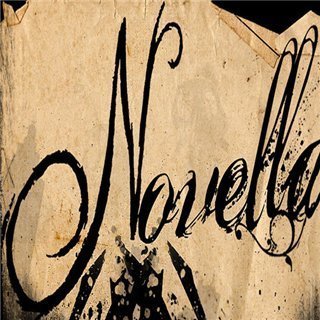 In a recent discussion, @AislingWeaver recently brought up the issue of length when it comes to publishing. Not too long ago, Taylor Antrim wrote a very good article on the novella. And just last month, Joe Fassler wrote an article on the novella’s recent resurgence for the Atlantic.
In a recent discussion, @AislingWeaver recently brought up the issue of length when it comes to publishing. Not too long ago, Taylor Antrim wrote a very good article on the novella. And just last month, Joe Fassler wrote an article on the novella’s recent resurgence for the Atlantic.
There’s a notable literary gulf between the 10,000 max word short story (very few anthologies will accept anything more than about 5,000 words) and a 60,000 word novel (the minimum word count for a novel, for most publishers). Are there not stories that require more than 10K and less that 60K?
The obsession with the word-count and, therefore, the page count, has been a significant reason why the novella has, until recently, been seen as an anachronistic and literarily unimportant form. You still see very few literary reviews on novella length works. And yet some of the most magnificent works of the late 19th and 20th Century have been novellas. Joseph Conrad’s Heart of Darkness. George Orwell’s Animal Farm. Jacob’s Room by Virginia Woolf. The Dead, by James Joyce. Almost all of the most celebrated writers of the 20th century have written novellas. But…commerce has gotten in the way. How do you price one? In print, a novella costs almost as much to print as a novel, and yet you can’t charge the same amount of money. Readers will balk when they’re asked to pay the same for a 30 page novella as a 120 page novel.
Happily, the advent of the ebook has put an end to that particular issue. The novella is a wonderful length for an ereader. And many of the small ePresses, especially in the erotica genre, are producing them.
But what makes a novella a different beast is more than just its length. Novellas seldom have more than a single narrative voice. They seldom switch POVs. They tend to follow one set of characters down one, very deep, rabbit hole. A novella offers the writer the opportunity to truly delve into a character. It affords them time to be lushly descriptive of setting and atmosphere. It allows for depth and complexity in plot with no dilution.
For me, the novella is the perfect experiential journey length for a single main character. I don’t need to tack on side-plots to bulk out a story. I don’t need to reveal multiple points of view and dilute the reader’s experience of immersing in a very close, interior relationship with the main character. It allows me to luxuriate in the subjective experience.
I think the novella is an exceptional form for erotic fiction. I’ve often read erotic fiction short stories that simply don’t offer enough depth of character to make the sex in the story really contextual. And similarly, I’ve read many erotic fiction novels where, frankly, I felt that scenes just went on too long, or spurious conflicts were dropped in to bulk out the story into novel length. Sometimes, they just needed a bloody stern editor.
What do you think of the novella? Have you written one? What’s your favourite one?


June 12, 2012
The Quitter
 I sat on the cabin’s rickety porch, looked out at the rain coming down in sheets, and jonesed for a cigarette. Two days into my self-imposed detox exile, I was pretty confident that my third attempt to quit smoking was going to end in failure.
I sat on the cabin’s rickety porch, looked out at the rain coming down in sheets, and jonesed for a cigarette. Two days into my self-imposed detox exile, I was pretty confident that my third attempt to quit smoking was going to end in failure.
Both previous attempts to quit had been played out in urban environments where 24hr convenience stores are just far too ubiquitous. The third time, I had resolved to wean myself off the demon weed in the middle of nowhere.
72 hours, my doctor swore, is all it took to completely cleanse the nicotine out of your body. So, although I was the very opposite of an outdoorsy individual, there I was, sleepless at three in the morning, sitting in a diabolically quaint, hand-made rocking chair, getting splinters in my ass cheeks. I was cold, half-insane and fantasizing about biting the heads off small warm-blooded animals when he sauntered by.
Yes. He sauntered. In the middle of a rainstorm, in a stretch of virgin forest beside Lake Williams, at three in the morning. He sauntered by, right down the path that led to the cabin, like he owned the place.
“Hey, you! What the fuck do you think you’re doing?”
He stopped and turned towards me. His dark hair was plastered to his face. The sweatshirt and jogging pants he wore were so drenched they were stuck to his body.
“Who are you?” he called through the downpour.
“Don’t ‘who are you’ me, asshole. Who the fuck are you?” I’ve always been ripe-mouthed, but the lack of nicotine made it much worse. And for no logical reason, my withdrawal symptoms had taken on a manic, territorial aspect.
“I own the place. Who are you?”
That brought me up a little short and explained why he was walking around as if he did. But rationality wasn’t getting in my way. I stood up, wrapped the grungy couch throw around myself and glowered at him. “I rent the place.”
He straightened a little and pushed his hands into his wet pant pockets. It made the whole garment sag. “I didn’t realize I was renting to an grouchy insomniac.”
It was his tone. It had an undercurrent of such easy good humour, it made my teeth itch.
“I’m not an insomniac, fuckhead. I’m a…” I paused, the combativeness suddenly evaporated. “Do you have a cigarette?”
The grass squelched jello-like beneath his sneakers as he strolled over to the front of the cabin. In the glare of the porchlight he looked like a drowned corpse. His skin took on a greenish tinge; his lips were almost cyanotic. My paranoia was on overdrive. Zombie.
“Not an inch closer, asshole.”
He took a pace back and held up his hands. “Do I look like a smoker to you?”
“Frankly, yes. You look like a dead smoker. A dead, waterlogged smoker. Recently arisen from its watery grave.”
He smiled. “You don’t look so good yourself. It’s the fluorescent light. Makes everyone look sick.”
I glanced up at the tube lighting which had been roughly installed on the roof’s overhang. “It could be entirely coincidental. You could still be the walking dead,” I said dryly.
“There’s only one way to tell, for sure.” He stepped forward again and held his hand up, over the rustic porch rail. “Carson.”
Securing the throw around me with a single hand, I shuffled forward, reached for his with the other and shook it limply. He was wet, but definitely warm. “Jill. Are you sure you don’t have a cigarette?”
“There are very few things in life I’m sure about. But that’s one of them. Don’t smoke. Never have.” He had very white teeth. They annoyed me.
“Lose the smugness,” I said miserably.
He shrugged without losing the smile, which only made me want to cleave his skull in two with an axe.
“So, you’re my new holiday renter. I’m kind of surprised. My agent usually finds nicer people.”
“I’m trying to quit smoking,” I growled, fighting to keep the shawl on. It was made from some hideous, homey knitted stuff that sagged and slipped off my shoulders. “I’m not here for the scenery.”
“You look cold. Why don’t you go inside and light a fire? I leave a good pile of dry pinewood in there for guests.”
“I saw that.”
“So why don’t you light it?”
I clenched my jaw. It hurt to even say it. “I don’t know how.”
Carson furrowed his brow, which channeled the rainwater. He wiped his eyes with a wet hand. “You’re kidding, right?”
“No, I’m not kidding. Why would I kid about that?”
“I guess you wouldn’t.” He looked satisfyingly sheepish. “Want me to light it for you?”
I thought for a moment. I wondered whether wood smoke would feel anything like tobacco smoke when inhaled. I had a hazy memory of burning logs and a sort of acrid aroma.
“Okay.”
He didn’t wait. He bounded up the porch steps like a radioactively mutated giant puppy. It made the entire structure shake.
“Wait a minute!” I said. “You’re not going in my cabin dripping water all over the floor.”
In fact, as he stood there, his sopping clothes pooled a modest lake around his large, grubby running shoes. And that’s when I got a good look at him. The withdrawal-engendered anger released its vice-like grip on my jaw and slid down into my groin.
“You’re going to have to take them off,” I said, sitting back down on the rocker.
“My shoes? Oh, of course.”
“No,” I said, dropping my voice an octave. I drew my feet up under me and let the throw slip off one bare shoulder. “All of it.”
* * *
For a few seconds nothing happened. Tall and gangly, he just stood there looking at me. The rain hissed into the woods around us. The rocking chair creaked once.
“You’re kidding.”
“That’s the second time you’ve said that. It’s boring.”
“All of it?”
“Yes, all of it. You’re…” I looked down at the floor at his feet, “…leaking.”
For a moment I thought he was going to balk. Then, with what seemed to me a fair amount of deliberation, he smiled and pulled the sweatshirt over his head. It was so wet, the t-shirt underneath came off with it, exposing a lean torso with a dark, sparse crop of hair that began at mid chest and narrowed into a line that snaked its way under the waistband of his jogging pants. He didn’t have a six-pack. In fact, he was just slightly and endearingly meaty around the middle. His nipples were small and dark and very puckered in the chill of the air. His skin gleamed under the light.
I may have emitted a little squeak of pleasure. I’m not sure. But as he dropped the clump of wet shirts onto the floor beside him, he looked up nervously.
“I don’t look much like the pool boy in a porn movie, do I?”
I smiled. “I don’t let the pool boy light my fire.”
Carson began to laugh but it fizzled out when I didn’t join in. “Well?”
“Shoes.”
He pried one off, and then the other.
“Socks?”
I watched him hop around a little as he pulled the sopping wet things off his feet.
“Pants.” I said, as nonchalantly as I could.
“You’re kidding.”
I stood and, dragging excess knitted throw behind me, shuffled up to stand in front of him. He had almost a foot on me. I looked up into his face and said, in the sweetest voice I could manage without nicotine and at an ungodly hour of the morning in the middle of a fucking forest, I said: “You *did* offer to light my fire, didn’t you?”
Even under the glare of that hideous light, I saw the flush come to his cheeks.
“Yes. I did.” His voice was unsteady.
“And you *do* want to do that, don’t you?” I purred.
“Well…” He looked slightly bewildered. “Yes, I guess I do.”
I fixed him with my gaze. “Then stop being so fucking coy and take your goddamned pants off. It’s not like I’ve never seen a naked man before.”
There was a wonderful quiver in the muscles of his jaw and I heard him swallow. He might have been rain soaked on the outside, but his mouth had dried up.
Keeping my eyes firmly on his, I watched, peripherally, as his arms moved. I heard the slide of wet cotton against skin as he pushed the jogging pants down over his hips and let them drop. They landed with a soft squelch.
“Excellent,” I said, turning away and stepping over the threshold of the cabin. “Come in.”
* * *
There is something truly delicious about watching a naked man with an erection walk around. Especially when you’re wrapped up all snug in a knitted blanket. I stretched out on the rustically downtrodden couch that sat in front of the fireplace and enjoyed the view. Carson, trying desperately to hide his self-consciousness, knelt before the empty hearth and piled first sticks, then logs, and then a few more sticks and wads of newspaper onto the grate. He really did have a lovely back. Long and heavy boned. His shoulder blades rolled beneath his pale skin as he worked.
The fire was impressive. I had, in fact, lied when I said I didn’t know how to build one, but I’d have never done as good a job. He was a firelighter par excellence. When he’d finished, he turned and grinned at me.
“See? It’s easy.”
“Especially when someone else does it for you,” I said. “Thank you.”
His gaze flitted around the room nervously before returning to me. “Would you…”
I arched an eyebrow and waited, trying hard not to let my attention slip down to the rampantly erect cock in his lap.
“…like some tea?”
“I would. One sugar, no milk.”
This time, as he stood up, I could tell he was still self-conscious, but the edge had come off it. I watched him, as he moved, with open admiration. He was decidedly pleasant to look at. His hair was drying off, turning from almost black to chestnut brown. His legs were long and muscled.
When he disappeared around the alcove that served as a kitchen for the cabin, I called out to him. “What were you doing out in the rain in the middle of the night?”
There was clinking and rustling.
“I run when I can’t sleep.”
“In the rain?”
“Sometimes. You get used to it.”
“So, where do you live?”
“Up at the big house. It’s about half a mile further along the lake shore.”
He came out carrying a tray, with two cups, a teapot and dishtowel over one shoulder. My stomach gave a little flutter. My lizard brain wondered why I couldn’t have one of these at home.
There was no coffee table. Instead, he crouched down and, setting the rattling tray on the rug in front of the sofa, knelt beside it. I watched him pour. Watched him drop a single sugar cube into my cup before stirring it and handing it to me.
I sat up a little straighter as I took it, settling one bare foot on his thigh. As he poured his own cup, I stroked the ball of my foot along the taut skin, feeling the slightly wiry hair brush the underside of my toes. The hand that held the teapot trembled slightly. The lid chinked against the pot.
The hardon, which had wilted a little as he’d prepared the tea, perked up again and brought a delightful ruddy flush to his cockhead. I sipped my drink and watched him avoid my eyes. The shyness was back.
I reached forward and let my fingertips trail down the side of his neck. Carson lifted the cup to his mouth and took what looked like a couple of scalding gulps.
“Tell me.”
“Yes?”
“Do you put sugar in your tea?”
“No.”
“Excellent.”
“Why?”
“Because after you’re finished drinking it, your tongue will be wonderfully hot.”
The fire crackled and spat. I moved to the edge of the sofa, tugged away the throw blanket and spread my thighs.
He put his cup down. “Now?” he whispered.
I threaded my fingers through his damp hair and pulled his head between my thighs.
“Absolutely now.”
I groaned as his warm mouth met my parted labia. And arched my back as I felt his gorgeously hot tongue slide between them.
Quitting smoking turned out to be easier than I feared. You just need the proper level of distraction, willing and obedient helper, and a cabin in the woods.


June 11, 2012
On Fanfic: Do it Baby, One more time
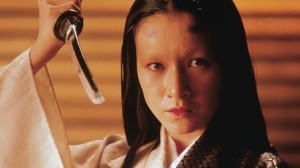 I just had a really compelling conversation on twitter about fanfic. It all started when I found this tumblr post by the lovely Cecilia Ryan.
I just had a really compelling conversation on twitter about fanfic. It all started when I found this tumblr post by the lovely Cecilia Ryan.
For some reason, this part of the post enraged me:
I do NOT like fanfic. Leave the story writing to the professionals on the shows. As someone who writes for a living, I find it insulting that fans think they are better at what I do than I am. There’s a reason I’m paid and you… are not.
It pissed me off in about a hundred different ways. I won’t enumerate all of them, but here’s a few:
How did those professionals GET to be professionals. Were they born that way?
Does she even know that those ‘professionals’ on television shows base their episodes on a ‘story bible’ that they didn’t write. In effect, most episodic tv writers ARE writing fanfic.
She’s insulted that her fans want to write? That her writing inspires them to write? That her characters or her storyworld fires their imaginations? Wow. I guess people can get offended at anything these days.
What an arrogant and unpleasant bitch.
As far as I know, this sort of authorial-privilege shit went out with Roland Barthes in the late 60s. We’ve been telling the same 25 stories for the last ten thousand years. We’ve been writing the same archetypal characters for just as long.
I’m not saying there is no originality. I’m saying that no one pulls their stories or characters out of thin air. We are all cultural inheritors. The myths, the folktales, the oral stories… every rags to riches romance you ever read has its feet firmly rooted in Cinderella. Every star-crossed-lovers story owes a debt of gratitude to Shakespeare.
And was Shakespeare’s King Lear devalued because Akira Kurosawa made ‘Ran‘?
And did Akira Kurosawa’s ‘Seven Samurai‘ lose anything when John Sturges made ‘The Magnificent Seven‘?
Did Buffy the Vampire Slayer become a less valuable product once someone wrote a piece of smutty fanfic about her doing Angel, or better yet, a bondage scene with Spike? Frankly, if you hadn’t imagined that in your own head, already, you weren’t enough of a fan. Do you really think Joss Whedon lost a penny of advertising or video sales because of the fanfic that’s been written about his creation?
Will we forever think of ‘Harry Potter’ as a deviant slut because someone wrote fanfic about him getting it from behind courtesy of Severus Snape?
Is anyone going to hesitate to buy another ‘Twilight‘ novel because E.L. James changed her name and stuck her in ‘Fifty Shades of Grey’?
If you really think that ‘Pride and Prejudice and Zombies‘ wouldn’t have put a huge smile on Jane Austen’s face, then you aren’t a very big fan of Austen. That woman had a wicked sense of humour. She would have loved it.
I just don’t get writers who hate fanfic. Why are they so ungracious? So ungenerous? Why do they think they can release their work into the pubic sphere and continue to control the meaning of it in the minds of the readers?
At best, fanfic immortalizes their work. People who read and love fanfic will ALWAYS go back to the source. Fanfic is, for the most part, an act of genuine love by fans who paid enough attention and cherished the original enough to be able to produce the fanfic.
At worst, fanfic may dilute and erode the original version of the stories or characters. And if it does, so what? Personally, I think any author who feels that fanfic has made them feel they’ve lost control of their characters had very little understanding of how the reader appropriates and internalizes text to begin with.
Beyond that, if you’re that brilliant an author, stop whoring your own literary product over and over again. Move on and write something new.
I’d like to leave you with a brilliant piece by Cory Doctorow on the subject. He addresses a lot of the issues much better than I have.
And, for my part, the moment someone writes fanfic based on one of my works is the moment I know I’ve arrived as a writer. So please, go ahead.


June 10, 2012
The Art of Perversion & The Perversion of Art
A number of people have remarked on the fact that, although I write stories set in a lot of different places, there are more stories set on Japanese themes than on any other single culture. There are certainly a lot of stories set in Spain, where I grew up, and in London, where I lived for a while, and a few set in Southeast Asia, where I live now. Although I’ve traveled to Japan on several occasions, I’ve never lived there. So why are so many of my stories set there?
There is a considerable amount of psycho-sexual development theory suggesting that the sexual beings we grow up to be are, at least in part, formed by the intersection of memorable stimulus at the tender age of sexual awakening. I think I was about 9 years old when I stumbled across my parent’s book on Japanese Woodblock prints. The book, which I cannot trace back now, was a hefty coffee-table sized volume bound, seductively, in hessian-covered hardback form. It was never hidden. It sat in a carelessly shelved collection of other art books, between a large one on Francisco Goya and a general volume containing high-quality prints of the French Impressionists. And, admittedly, I did spend a lot of time with the Goya book, which may go some way to explaining why my eroticism has such a dark side, and why I’m unaccountably turned on by his iconic “Tres de Mayo“. Of course, one could easily read all sorts of deeper meanings into my erotic response, but I think the explanation is really quite simple: I was just at that age where anything of any visual weight was going to turn me on. I also get turned on by the brutality of bullfights. I’m pretty sure this is just because I got taken to so many at that age. Slowly it evolved into a rather unflattering sexual fetish for violent spectacle. But that’s for another post.
Having by far more direct influence on my early sexualization was this book of Japanese woodblock prints. Included in the book were a number (probably more than the necessary representative amount) of shunga prints. “Shunga” is the Japanese word for spring. I gather this is a nature-based allusion to the way animals seem to get frisky during that season. Shunga encompases a wide range of visually erotic material: from cheap black and white images printed on rice-paper, to lush paintings on silk. Format wise, Japanese erotic art traditionally came in a number of different formats: from horizontal scrolls, to single sheets, to pamphlets and even calendars. Shunga was produced, in some form or other in Japan, from the late 16th Century through to the late 19th Century. I think it is fair to say that, although shunga material was widely used, it was never exactly ‘proper’ material for polite company. Attempts to censor it came and went throughout those centuries, but with little effect. It wasn’t until the beginning of the 20th Century that governmental powers in Japan decided to ban it outright and impose stiff penalties on its manufacture. Sadly and ironically, this has meant that until the last decade, there has been a legal prohibition on the importation of shunga artworks back into their country of origin!
However, by far the most valued works of shunga were produced during the Edo or Tokagawa period, during the height of the Ukiyo-e. This period saw the rise of some of the most important Japanese woodblock artists. Very few of them did not, at one point or another in their lives, produce shunga. It might be hard for people in the west to comprehend, but none of these artists’ reputations ever suffered for their production of explicit erotic prints. It was, as far as I can tell, a perfectly acceptable way to supplement their income as artists.
This series of prints, Prelude to Desire, by Kitagawa Utamaro, was first produced in 1799, but was reprinted again and again through the 17th Century
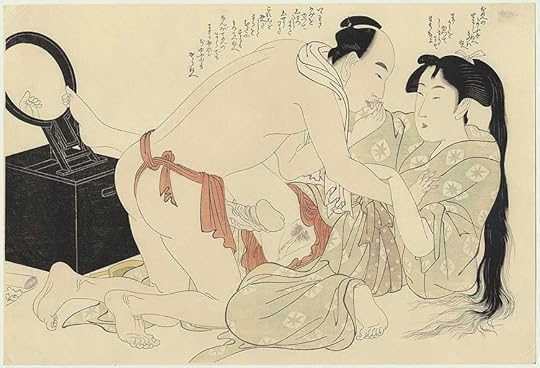
Prelude to Desire #D, Kitagawa Utamaro, 1799
Utamaro is known for his fine keylines, his subtle colouration and his amazing detail.
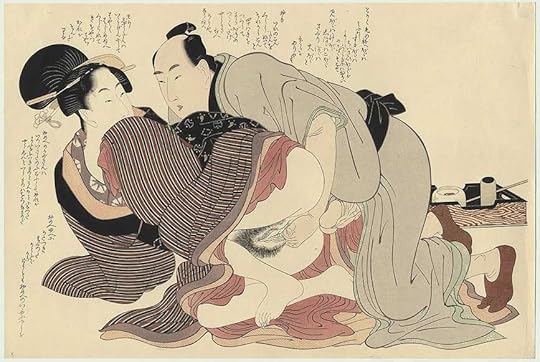
Prelude to Desire #F, Kitagawa Utamaro, 1799
I realize it’s not easy, but if you can wrench your eyes off the enormous genitals for a minute, take a look at the beautifully detailed kimono patterns, the mirror (in the first print), and the wood-grain on the box (in the second).
Other celebrated producers of shunga came out of what is known as the Utagawa school. Established by Utagawa Toyoharu, it is by far the most famous group of woodblock artists of the 19th Century. Hiroshige, Kunisada, Kuniyoshi and Yoshitoshi were all members of the school and it is hardly surprising that they also created some of the most beautiful shunga work, as well as wealth of exquisite non-erotic prints.
Unfortunately, because the head of the school changed and Japanese artists had a tradition of changing their name to reflect the influence of their teachers, a number of the prints from this period are not traceable to a single artist.
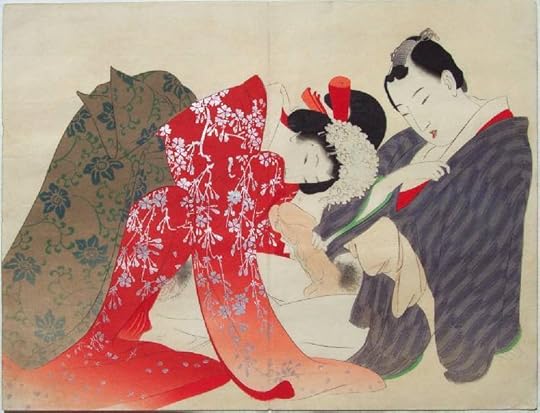
Geisha in Orange & Silver Kimono, Utagawa School, artist unknown, ca 1840
As you can see, the colours and gradiations are far richer in this print. This is partly due to the fact that woodblock printing technology simply got much more sophisticated, and also there were quality levels of shunga. From the very cheap to the extremely expensive. This particular print was produced using metallic inks to highlight the cherryblossom design on the geisha’s kimono.
Below is an example of a much lower-grade shunga in pamphlet format, by Kunisada II (i.e. a student of Kunisada who was gifted his name after the first Kunisada’s retirement)
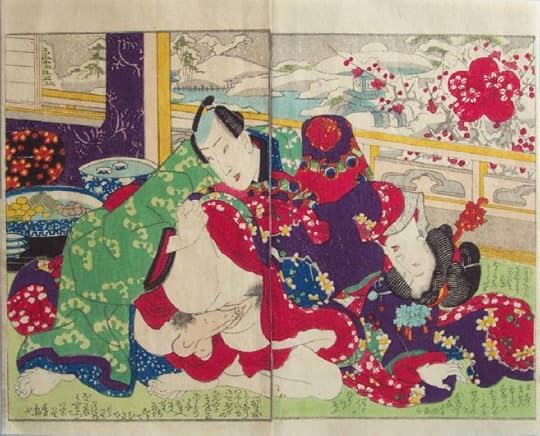
Before the Snowy Window, Kunisada II, mid 1800s
As you can see, the colours are brasher and the key-lines are not as clean. Although the scene outside in the background is quite detailed, it does not have the quality of the first three prints. Nonetheless, noteworthy in all these prints is the hallmark Utagawa school adoption of western techniques of perspective.
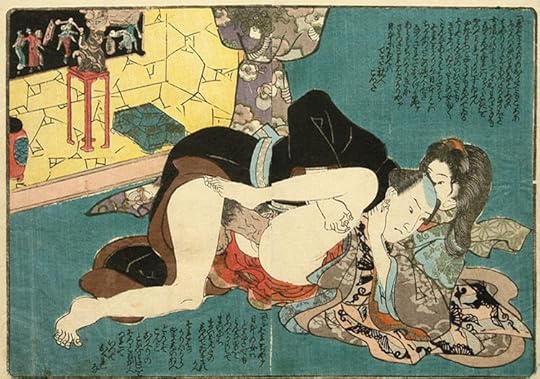
Incense Burner, Kunimaro, 1850
As you can see, they didn’t all get it quite right.
Although heterosexual sex predominates shunga, and images of cunnilingus or fellatio are very rare, there are some notable exceptions.
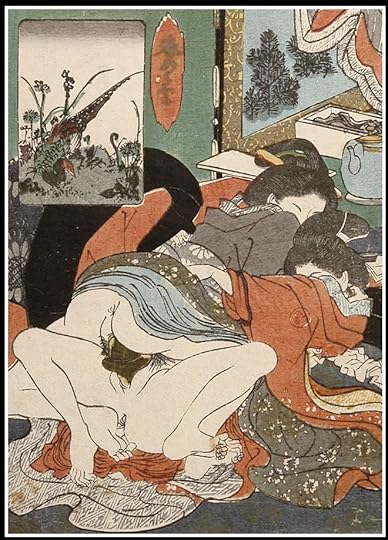
Double Sided Dildo, Eisen, ca 1840
Almost all the most famous shunga artists did include lesbian scenes in their repetoires, although there is some evidence that earlier books considered them too controversial. Later editions did include them. Akantiek.com has an excellent essay on lesbian shunga here.
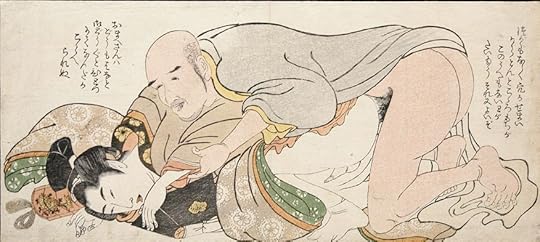
Temple Page, Utamaro, ca 1805
There are a number of good articles and online exhibits of gay shunga. Again, Akantiek.com has a good survey of gay shunga here. And Gay Art History.org has a nice online gallery here.
Voyeurism is a predominant theme in shunga. I haven’t really read any convincing attempts to explain why this is, but it is a significant kink that carries on into today’s Japanese porn. Singles overlook couples, people watch animals, children interrupt their parents. There is an intriguing masturbatory aspect to this type of shunga in many of its examples. I often wonder if this particular theme doesn’t hint at the viewers role in the consumption of the shunga in question. The peeking masturbator becoming the narrative companion of the shunga viewer?
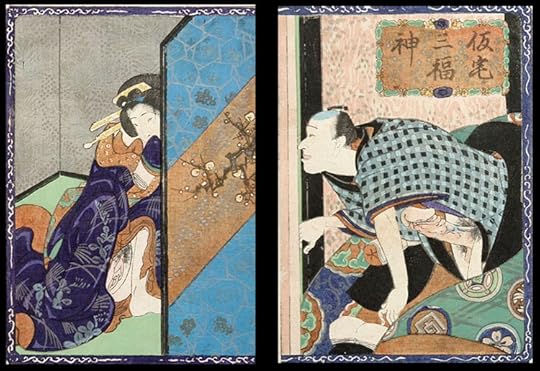
Voyeurism
There’s even a sweet piece of shunga showing a couple fucking while a pair of mice look on, and fuck as well.
For me, shunga was my first encounter with visual eroticism. Of course, like any 9-year old, the massive size of the organs both scared and fascinated me. And for a long time, I simply assumed that the Japanese were simply very well endowed. It wasn’t until I got older that I realized the artistic strategy of the enlargement wasn’t about sexual hyperbole, but a practical matter of making the part of the picture that would turn people on easier to see.
I also credit shunga with having saved me from that awkward stage that most adolescent girls go through of thinking cocks are vaguely disgusting but unavoidable. I did have a precocious admiration for the ridges and veined texture of cocks. I had a fascination for the shape of the head and the slightly comic demand of a rampant erection.
Finally, I’m pretty sure that first encounter with Japanese erotic woodblock prints played a major role in my desire, over 30 years later, to set some of my stories in Japan.
I would like to thank a couple of sites for generously making large galleries of shunga available online, in a large enough format to really appreciate them:
The Ukiyo-e Gallery Online has a wonderful set of prints, navigable by thumbnail.
Akantiek.com, out of the Netherlands, also has an enormous collection with excellent research, articles and attributions.
There are also a number of marvelous books on shunga. I’ve made a Shunga Wishlist on Amazon for convenience, but please note – it’s not actually a wishlist. I already own most of these texts.


June 2, 2012
Suspense and the Happy Ending
If you’re an Erotic Romance reader, I would really like to talk to you.
I’m interested in your experience of happy endings in erotic romance and how, even though you know that the story will end with the lovers getting together, you feel a level of suspense during your reading of the story.
If you are willing to help me investigate this, would you please pop on over to my academic blog and sign up?


June 1, 2012
What’s In A Name?
 It has been a long time since I have considered my pen name. I started using it back in 1999 on a newsy sort of blog to keep in touch with family and friends when I moved to Southeast Asia. It started as a joke – a reference to a character in George Orwell’s ‘Burma Days’. One of his characters was a ‘remittance man’. A rogue who’d been sent out to the colonies by his family to stop him from besmirching the family name with his deviant behavior. He was sent a stipend or ‘remittance’ to live on, as long as he kept away.
It has been a long time since I have considered my pen name. I started using it back in 1999 on a newsy sort of blog to keep in touch with family and friends when I moved to Southeast Asia. It started as a joke – a reference to a character in George Orwell’s ‘Burma Days’. One of his characters was a ‘remittance man’. A rogue who’d been sent out to the colonies by his family to stop him from besmirching the family name with his deviant behavior. He was sent a stipend or ‘remittance’ to live on, as long as he kept away.
When I started writing my first pieces of fiction, I used that name. It just stuck. I have since published three novels and appeared in over a dozen print anthologies under the pen-name Remittance Girl.
The first time I encountered a problem with the name was when I tried to establish an account on Facebook. I had to append the word ‘author’ before they would accept it.
Three days ago, I got this:
 I also got an email Google+ telling me that my name is not acceptable to them. They provided a function to lodge an appeal, and of course I did. I included links to my blog, my Amazon author page, my Facebook account and my Goodreads author page. I even sent them photographic copies of the table of contents where my name appears as the authors of published stories. Still no luck.
I also got an email Google+ telling me that my name is not acceptable to them. They provided a function to lodge an appeal, and of course I did. I included links to my blog, my Amazon author page, my Facebook account and my Goodreads author page. I even sent them photographic copies of the table of contents where my name appears as the authors of published stories. Still no luck.
Why is this so upsetting to me? It’s just a pen name, after all. Why don’t I quite whining?
I’m not exactly sure how to express this, but Remittance Girl is over a decade of my life. She is all the stories I’ve written. All the interaction I’ve had with readers and other writers. She is… me. She represents me identity as a writer. I can’t let her go.
The truth is, as I embark on my PhD, I have had to ‘out’ myself. Any academic writing I do on the subject of erotic fiction needs to be under my real legal name. That’s fine. I’ve resigned myself to that. But it occurs to me that this disregard for erotica authors’ choice of a pen name is a little disturbing.
Why would it be okay if I used the pseudonym of Mary Smith? Why is a pen name that sounds like a real name okay, but a pen name that is very clearly a pen name forbidden?
I chose to keep Remittance Girl because it is so very obviously a pen name. And a lot of published erotica writers do the same. I’m pretty sure that Violet Blue wasn’t born with that name.
So this is my fight to try and keep my name. Not only because it is the name you know me by and the one I’ve written under for so long, but because having lived with it for over a decade, it has become an integral part of who I am as a person. Being forced to abandon it feels really horrible. It feels like all these years of me as Remittance Girl are worthless, illegitimate, and disposable.
I would be very grateful if you would consider signing asking them to reconsider my appeal to keep my pen name.





